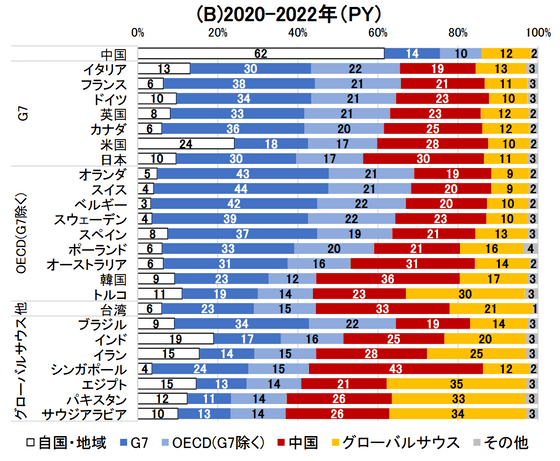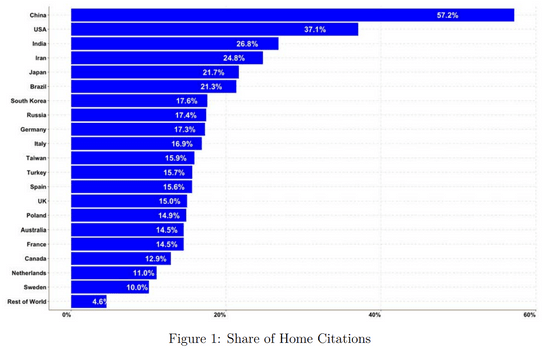It is pointed out that Chinese scientists' 'excessive citation of their own country's papers' is distorting international scientific rankings

The influence of academic papers is quantified by the number of citations, which is the number of times a paper is cited by other papers. The scientific journal Nature has
China's scientists often cite work from their own nation. Is that skewing global research rankings? | Science | AAAS
https://www.science.org/content/article/china-s-scientists-often-cite-work-their-own-nation-skewing-global-research-rankings
It's long been known that scientists working in one country tend to cite papers from their own country, but a series of separate reports published in 2024 have highlighted China as particularly prominent when it comes to nationalism.
One such analysis was published in August 2024 by Japan's National Institute of Science and Technology Policy (NISTEP). In their Science and Technology Indicators 2024 report , researchers looked at more than 1 billion citations recorded in the global citation database Web of Science and reported that 62% of the citations for the top 10% of papers published in China came from within the country.

There are both positive and negative aspects to China's citation bias. According to Huang Futao of the Hiroshima University Higher Education Research and Development Center, Chinese researchers often cite papers from their own country because 'they are publishing high-quality research at a rapid pace.' In addition, another reason is that many Chinese research institutions 'strategically place importance on publishing in influential academic journals.'
Li Tang, a science policy expert at China's Fudan University, pointed to the rapidly growing population of Chinese researchers who are highly interested in research being conducted in the country, as well as the existence of a culture of '
But it also hints at what Science describes as 'shady practices,' such as 'citation stacking,' a strategy in which scientists often cite unrelated research to do favors for colleagues or to boost the reputation of their research institutions.

NISTEP's analysis does not distinguish between legitimate and unnecessary citations. It also found that Western researchers are increasingly citing Chinese papers. This suggests that China is conducting very influential research, said NISTEP analyst
A German analysis found similar results: To quantify how China's domestic citation bias is affecting its global rankings, Claudia Steinwender of Ludwig Maximilian University of Munich and her colleagues identified 461 scientific journals that make up the top 10% of journals across 20 broad scientific fields, extracting more than 200 million citing-article pairs from issues published between 2000 and 2021.
The results showed that 57.2% of citations to papers published in China were domestic, the highest percentage of any country surveyed, compared with 37.1% for the United States, 26.8% for India, 24.8% for Iran, and 21.7% for Japan.

According to Steinwender, it is natural that larger countries have a higher proportion of domestic citations because they have many researchers who can be cited.
However, when the analysis was conducted taking into account the 'size bias,' which means that larger countries receive more citations, it was found that the proportion of domestic citations in China was greater than would be expected given its size. In addition, when the citation ranking was created after correcting for the bias, China's ranking fell to fourth place, behind the United States, the United Kingdom, and Germany.
Based on these analysis results, Steinwender et al. concluded in a report published in May 2024, ' Paper Tiger? Chinese Science and Home Bias in Citations ,' that 'China's rise in the citation rankings has been exaggerated.'
Caroline Wagner, a science policy researcher at Ohio State University, told Science, 'Fraud, plagiarism, and low-quality open access journals completely distort the citation count, a metric we've used for years to gauge the output and impact of research. These data are not just problematic for self-congratulatory purposes; they also affect scientists' careers, their ability to attract collaborators and students, and government funding priorities, making accurate assessment of citation counts one of the challenges in the field.'
Related Posts:
in Science, Posted by log1l_ks







